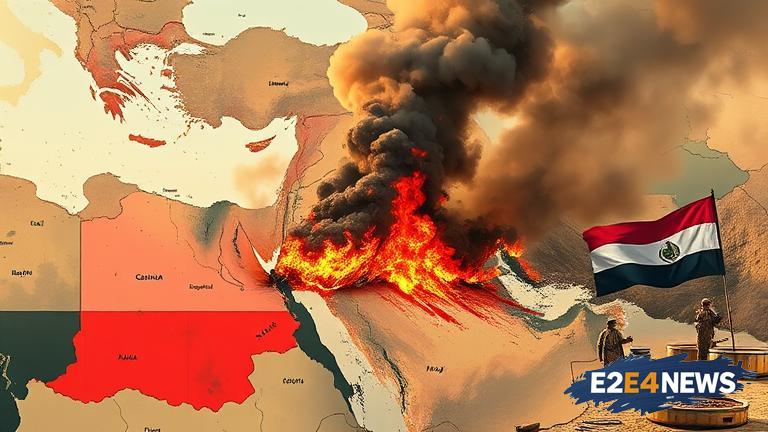The Middle East has long been a region of complex geopolitics, with various countries vying for influence and power. Recently, tensions have escalated, with several countries involved in conflicts and diplomatic efforts to resolve them. The region’s rich history and cultural diversity have contributed to its complexity, with many nations having competing interests and agendas. The ongoing conflicts in countries such as Syria, Yemen, and Libya have resulted in significant humanitarian crises, with millions of people displaced and in need of aid. The international community has been working to find solutions to these conflicts, with various diplomatic efforts underway. The United States, in particular, has been actively engaged in the region, with a focus on countering the influence of Iran and promoting stability. The US has also been working to strengthen its relationships with key allies, such as Saudi Arabia and the United Arab Emirates. Meanwhile, other countries, such as Turkey and Russia, have also been increasing their involvement in the region, with their own interests and agendas. The situation in the Middle East is further complicated by the presence of various non-state actors, such as terrorist groups and militias. These groups have been responsible for numerous attacks and have contributed to the instability in the region. Despite the challenges, there are also opportunities for cooperation and diplomacy in the Middle East. The region is home to significant oil and gas reserves, and many countries are working to develop their economies and diversify their industries. The Middle East is also an important hub for trade and commerce, with many countries relying on the region’s strategic location to facilitate the movement of goods and services. In recent years, there have been efforts to promote tourism and cultural exchange in the region, with many countries investing in infrastructure and hospitality projects. However, the ongoing tensions and conflicts have had a negative impact on these efforts, with many tourists and investors deterred by the instability. The international community has a critical role to play in promoting peace and stability in the Middle East. This can be achieved through diplomatic efforts, such as negotiations and mediation, as well as through economic support and development projects. The region’s countries must also work together to address the common challenges they face, such as terrorism and extremism. By promoting cooperation and understanding, the Middle East can overcome its current challenges and achieve a more peaceful and prosperous future. The region’s rich history and cultural heritage are an important part of its identity, and efforts to preserve and promote these assets are essential. The Middle East is also home to many important archaeological sites and historical landmarks, which attract visitors from around the world. Despite the many challenges it faces, the Middle East remains a region of significant importance and influence, with a rich history and a diverse culture. The international community must continue to engage with the region and work towards promoting peace, stability, and prosperity. The Middle East’s future is uncertain, but with cooperation and diplomacy, it is possible to achieve a more peaceful and stable region. The region’s countries must work together to address their common challenges and promote economic development and cultural exchange. By doing so, the Middle East can overcome its current challenges and achieve a brighter future. The international community has a critical role to play in supporting these efforts and promoting peace and stability in the region.





